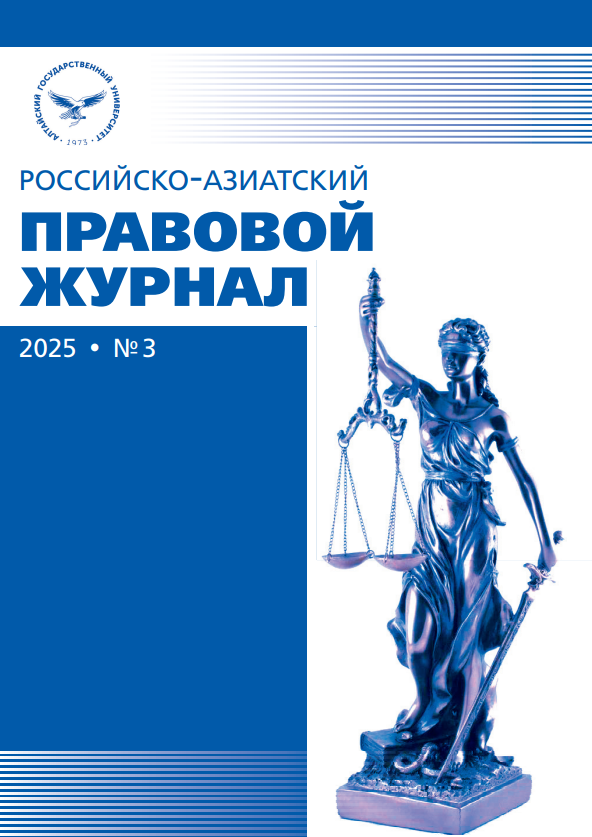THE LEGAL NATURE OF THE “ESTOPPEL” CATEGORY: PRINCIPLE, RULE, OR OTHER PHENOMENON
УДК 34:008 ББК 67.05
Abstract
This article examines the nature of such a category as “estoppel” using the method of generalization, aswell as comparative analysis. Based on the analysis and generalization of the norms of law and law enforcementpractice, the author will try to answer what this phenomenon is: a principle, rules, or a completely differentphenomenon.
Downloads
References
2. Енилеева А.Э. Деление норм права на правила и принципы в учении Р. Алекси // Ученые записки Крымского федерального университета им. В.И. Вернадского. Юридические науки. 2015. №1. С. 26–33.
3. Обзор судебной практики Верховного Суда Российской Федерации №4 (2017): Президиумом Верховного Суда РФ от 15.11.2017 // Бюллетень Верховного Суда РФ. 2018. №11.
4. Определение Судебной коллегии по экономическим спорам Верховного Суда Российской Федерации от 08.10.2024 №300‑ЭС‑6956 по делу СИП‑295/2023 // КонсультантПлюс.
5. Michael Barnes QC. The law of Estoppel // Michael Barnes QC. London: Bloomsbury Publishing Plc, 2020. С. 908.
6. О применения судами некоторых положений раздела I части первой Гражданского кодекса Российской Федерации : Постановление Пленума Верховного Суда РФ от 23.06.2015 №25 // Российская газета. 2015. №140.
7. Гражданский кодекс Российской Федерации (ч. I) : Федеральный закон от 30.11.1994 №51‑ФЗ (ред. от 08.08.2024) // Собрание законодательства РФ. 1994. №32. Ст. 3301.
8. Арбитражный процессуальный кодекс Российской Федерации : Федеральный закон от 24.07.2002 №95‑ФЗ (ред. от 08.08.2024) // Собрание законодательства РФ. 2002. №30. Ст. 3012.
9. Гражданский процессуальный кодекс Российской Федерации : Федеральный закон от 14.11.2002 №138‑ФЗ (ред. от 26.10.2024) // Российская газета. 2002. №220.
Copyright (c) 2025 А. А. Шмаков

This work is licensed under a Creative Commons Attribution 4.0 International License.
Russian-Asian Law Journal is a golden publisher, as we allow self-archiving, but most importantly we are fully transparent about your rights.
Authors may present and discuss their findings ahead of publication: at scientific conferences, on preprint servers, in public databases, and in blogs, wikis, tweets, and other informal communication channels.
Russian-Asian Law Journal allows authors to deposit manuscripts (currently under review or those for intended submission) in non-commercial, pre-print servers such as ArXiv.
Authors who publish with this journal agree to the following terms:
- Authors retain copyright and grant the journal right of first publication with the work simultaneously licensed under a Creative Commons Attribution License that allows others to share the work with an acknowledgement of the work's authorship and initial publication in this journal.
- Authors are able to enter into separate, additional contractual arrangements for the non-exclusive distribution of the journal's published version of the work (e.g., post it to an institutional repository or publish it in a book), with an acknowledgement of its initial publication in this journal.
- Authors are permitted and encouraged to post their work online (e.g., in institutional repositories or on their website) prior to and during the submission process, as it can lead to productive exchanges, as well as earlier and greater citation of published work (See The Effect of Open Access).








